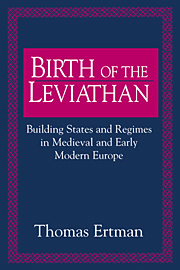Book contents
- Frontmatter
- Contents
- List of Tables
- Acknowledgments
- 1 INTRODUCTION
- 2 THE ORIGINS OF PATRIMONIAL ABSOLUTISM IN LATIN EUROPE
- 3 THE TRIUMPH OF PATRIMONIAL ABSOLUTISM AND THE FAILURE OF REFORM IN LATIN EUROPE, c. 1500–1789
- 4 BUREAUCRATIC CONSTITUTIONALISM IN BRITAIN
- 5 BUREAUCRATIC ABSOLUTISM IN GERMANY
- 6 THE TRIUMPH OF PATRIMONIAL CONSTITUTIONALISM IN HUNGARY AND POLAND AND ITS PREMATURE DEMISE IN SCANDINAVIA
- 7 CONCLUSION
- Bibliography
- Index
4 - BUREAUCRATIC CONSTITUTIONALISM IN BRITAIN
Published online by Cambridge University Press: 12 March 2010
- Frontmatter
- Contents
- List of Tables
- Acknowledgments
- 1 INTRODUCTION
- 2 THE ORIGINS OF PATRIMONIAL ABSOLUTISM IN LATIN EUROPE
- 3 THE TRIUMPH OF PATRIMONIAL ABSOLUTISM AND THE FAILURE OF REFORM IN LATIN EUROPE, c. 1500–1789
- 4 BUREAUCRATIC CONSTITUTIONALISM IN BRITAIN
- 5 BUREAUCRATIC ABSOLUTISM IN GERMANY
- 6 THE TRIUMPH OF PATRIMONIAL CONSTITUTIONALISM IN HUNGARY AND POLAND AND ITS PREMATURE DEMISE IN SCANDINAVIA
- 7 CONCLUSION
- Bibliography
- Index
Summary
It would be difficult to find a greater contrast than that between the patrimonial absolutism of 18th-century France and its Latin neighbors and the bureaucratic constitutionalism of France's great geopolitical rival, Britain. The absolutist rulers of Latin Europe could legislate, tax, and conduct foreign policy as they saw fit, unconstrained by national representative assemblies; whereas in Britain, the monarch, though still influential, had lost many of his effective powers to a Parliament without whose approval no new laws could be passed, revenue raised, or wars begun. State infrastructures in Latin Europe were built around proprietary officeholding, “inside” credit, and tax farming; while Britain possessed a set of core administrative, financial, and military departments numbering close to 10,000 employees organized along modern bureaucratic lines, and an entirely market-based system of public finance. Finally, Latin Europe's confused patchwork of local administrative districts overseen by competing proprietary officials constrasts sharply with an orderly pattern of 52 English and Welsh and 33 Scottish counties enjoying a substantial degree of self-government.
Certain similarities can of course be found between these two disparate state types, most notably the survival within Britain of isolated pockets of proprietary officeholding within the Exchequer and the royal household. Yet on the whole, the two types do seem to represent polar opposites within the world of early modern Europe. This is all the more remarkable given that England shared many common historical experiences with the countries of Latin Europe. Like them it had been part of the Roman Empire, and during the Anglo-Saxon period had maintained significant cultural ties with the Carolingian realm.
- Type
- Chapter
- Information
- Birth of the LeviathanBuilding States and Regimes in Medieval and Early Modern Europe, pp. 156 - 223Publisher: Cambridge University PressPrint publication year: 1997



